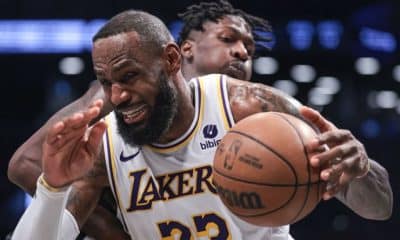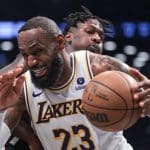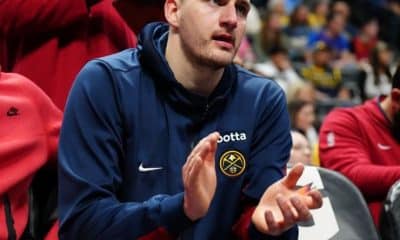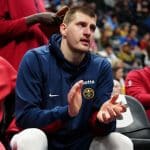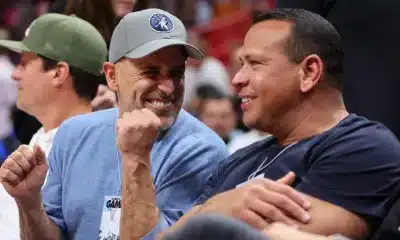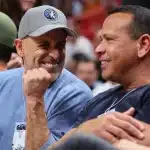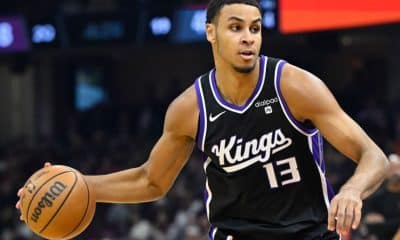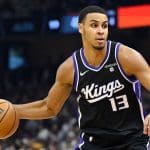NBA
Team USA Wins Gold At Maccabiah Games
Jake Rauchbach highlights key contributors to Team USA’s Gold Medal run at the 2019 Maccabiah Games in Budapest, Hungary.
Every four years, approximately 3,000 Jewish athletes from 40 different nations competing in a total of 19 disciplines partake in the European Maccabiah Games for a chance to win a Gold Medal.
This year, the games took place in Budapest, Hungary. Just like the Olympic games, each country fields a team to bring home medals for their respective countries, while maintaining a larger goal of strengthening Jewish relations with foreign countries.
Since its inception in 1932, athletes such as Dolph Schayes have competed in Maccabiah, and throughout the Games’ storied history, basketball has gradually grown into the Games’ most visible sport. With past participants such as David Blatt, Larry Brown, Ernie Grunfeld, Nat Holman and Bruce Pearl, the Maccabiah Games have served as a world stage for the best of the best when it comes to Jewish sportsmen and sportswomen.
This year’s Maccabiah Team USA was comprised of eleven players: Spencer Freedman (Harvard), Grant Greenberg (St. Mary’s), Austin Lavitt (Connecticut College), Sam Iorio (South Alabama), Eli Abaev (Austin Peay), Daniel Schreier (Manhattan), Gabe Ravetz (Wesleyan Ohio), Julian Marx (Grinnell College), Jeremy Horn (Claremont McKenna), Robbie Feinberg (Harvard) and Michael Feinberg (Yale).
After a four-day training camp in Long Island, New York, Team USA headed off to Budapest, where the team needed to perform well during the pool play stage to earn the right to compete for the Gold during the medal round.
Early on in pool play, Eli Abaev established himself as a force to be reckoned with in the post, Spencer Freedman’s consummate leadership and command of the offense shined through and Sam Iorio and Grant Greenberg’s multi-faceted scoring ability helped to carry Team USA. Jeremy Horn also emerged as a key low-post contributor during the first two rounds of play.
After dispatching host country Hungary, Team USA faced off against a big and experienced Russia squad in Game No. 2 of pool play. Russia, the defending European Maccabiah Games champion from four years ago, came poised to repeat.
With size across the front line, Avi Abrili (6-foot-9), Roman Murzin (6-foot-8), Igor Shatasvidi (6-foot-6), and a potent and savvy backcourt in 6-foot-7 scoring wing Igor Lavrijenko, and point guard Andrei Shtarev, Russia presented one of the biggest obstacles to the less experienced USA squad.
Combined with a great start to the game and key contributions from the scoring duo of Abaev (17 points/16 rebounds) and Greenberg (21 points on 8-15 shooting), USA was able to pull away early and earn a key pool play win over Russia, 77-64.
Abaev, a rising junior at Austin Peay, emerged as an elite-level rebounder and low-post scoring threat, averaging 17 points and 15 rebounds per game throughout the tournament. Don’t be surprised if Abaev’s high-energy play and relentless pursuit of the ball make him an impact player in the Ohio Valley Conference this upcoming season.
Greenberg’s steady play throughout the tournament has garnered him interest from professional teams in Israel. The team relied on his leadership and scoring ability heavily. Greenberg’s experience winning Gold in the 2017 Israeli Maccabiah Games played a big part in the team’s success.
“I think my experience two years ago really gave me the fire to lead this team and help bring back a gold medal,” Greenberg said.
Led by the sharpshooting of Iorio, Marx, and Ravetz, Team USA then dispatched Germany and Israel. Iorio posted 18 points versus Israel, Marx registered 16 points on 4-of-5 three-point shooting versus Germany and Ravetz got himself into a rhythm, knocking down 3-of-7 threes en route to 14 points versus Germany.
Up next was the rematch of the 2017 World Maccabiah Gold Medal game with Maccabi France. In the 2017 game in Jerusalem, there were no less than 15 future professional players that competed. The game was hard-fought and came down to the wire.
This year’s French team was again loaded, made up of six professional players and led by professional coach Pierre Haddad. France’s athleticism, elite passing and international experience far exceeded that of Team USA.
This being said, USA came ready.
Rising sophomores Spencer Freedman, Daniel Schreier and Michael Feinberg led the way in the game. Freedman – Harvard’s point guard of the future – ran the offense seamlessly, registering 16 points and six steals. Knocking down five three-point shots, many wondered if Freedman was even aware of the three-point line, as many, if not all, of his long-range makes were well beyond the NBA line.
Battling through hypersomnia during training camp and on the flight over, Schreier broke out of in a big-time way, making the most of his opportunity and insertion into the starting lineup. His toughness and never-back-down attitude proved vital in sparking the Team USA’s defensive efforts. Feinberg, the younger of the two brothers, added 10 points and several key individual defensive stops during the game. Look for Schreier and Feinberg to step into bigger rotational roles at Manhattan College and Yale this season.
Another key contributor was Claremont McKenna’s Jeremy Horn. The rising senior big man posted 8 points and 10 rebounds off of the bench and was the consummate teammate all tournament long.
With the team locked-in for 40-minutes, Team USA rolled France 88-38, likely playing its best game of the tournament.
“This was a test of our maturity and unselfishness,” said Robbie Feinberg, the team’s captain. “We wanted to throw the first punch right away.”
With the win, it set up a rematch with Russia for the Gold Medal. Going into the game, USA knew it was going to be a battle. Connecticut College’s Austin Lavitt, who due to injury assumed a coaching staff role during the games, provided key counterpart analysis throughout the tournament.
“We knew it would be difficult to face a team full of professionals a second time around, but if there was any team capable to do it, it was us,” said Lavitt.
Going into the championship game, USA Assistant Coach Jeff Wulbrun’s scouting prioritized rebounding and adherence to personnel matchups, with Russia’s best player Igor Lavrijenko garnering much of the attention. This proved spot-on.
After USA led for most of the game, Russia crept back into it with frontline rebounding and Lavrijenko’s perimeter shooting. Lavrijenko, who torched Team USA for 23 points and 10 rebounds in the first matchup, came alive in the second half, knocking down clutch shot after clutch shot. His three-point make from the top of the key with 3:30 to go in the fourth quarter, gave Russia a three-point lead, and their first since the 9-minute mark of the first.
Enter Gabe Ravetz, one of the biggest storylines of the entire tournament. Ravetz, whose minutes fluctuated from game-to-game, never lost focus or confidence in himself. To his credit, Ravetz came through clutch.
“I was just waiting to get in the game I was ready to go out and make a play,” said Ravetz. “I was operating below the magma.”
With Russia making its push and USA’s offense stalled, Ravetz proceeded to nail three contested three-point shots in a row, scoring 12 points in the last three minutes of the game. The scoring outburst turned the tide for the USA, with the squad never looking back, capturing the Open Gold Medal for the second consecutive time in as many games.
“It was probably the greatest honor of my life to be a part of this team, not only were we playing to represent our country, but our religion and our culture,” said Marx.
With the chutzpah and passion displayed throughout the 2019 Maccabiah, and considering the history and over-aching mission of the Games, it was no surprise that Maccabi Team USA was playing for much more than just bringing home the Gold.
Add Basketball Insiders to your Google News Feed!
-
Main Page 1 week ago
LeBron James joins Michael Jordan as only NBA players with multiple 40-point games after turning 39
-
Main Page 1 week ago
Nikola Jokic 1st NBA player since Oscar Robertson with 26+ points, 18+ rebounds, & 16+ assists in a game
-
NBA 1 week ago
Ex-MLB star Alex Rodriguez vows to keep trying to buy Timberwolves franchise despite rejection
-
Main Page 1 week ago
Kings are 14-5 this season when Keegan Murray scores 19+ points
